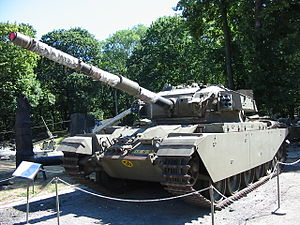
Back Royal Ordnance L7 German Royal Ordnance L7 Spanish Royal Ordnance L7 Finnish L7 (canon) French תותח L7 HE Royal Ordnance L7 (meriam tank 105 mm) ID Royal Ordnance L7 Italian ロイヤル・オードナンス L7 Japanese 로열 오드넌스 L7 Korean Royal Ordnance L7 NB
| Royal Ordnance L7 | |
|---|---|
 An L7 mounted on a Centurion Mark 5 | |
| Type | Rifled tank gun |
| Place of origin | United Kingdom |
| Service history | |
| Used by | See Usage |
| Production history | |
| Designed | late 1950s |
| Manufacturer | Royal Ordnance Factory BAE Systems |
| Specifications | |
| Mass | 1,282 kg (2,826 lb) |
| Length | 5.89 m (19 ft 4 in) |
| Barrel length | 52 calibres 5.46 m (17 ft 11 in) |
| Shell | 105×617mmR |
| Calibre | 105 mm (4.13 in) |
| Rate of fire | 10 rounds per minute (maximum) |
| Maximum firing range | 4,000 m (4,400 yd) |
The Royal Ordnance L7, officially designated Gun, 105 mm, Tank, L7, is the basic model of the United Kingdom's most successful tank gun. It is a 105 mm L/52 rifled design by the Royal Ordnance Factories, intended for use in armoured fighting vehicles, replacing the older QF 20-pounder (84 mm) gun mounted on the British Centurion tank.[1] The successful L7 gun has been fitted on many armoured vehicles, including the Centurion (starting from the Mk. 5/2 variant), the German Leopard 1 and, in an altered design, as the M68 gun in several variants of the US M48 Patton and M60.
The L7 is a popular weapon and continued in use even after it was superseded by the L11 series 120 mm rifled tank gun, for some Centurion tanks operating as Artillery Forward Observation and Armoured Vehicle, Royal Engineers (AVRE) vehicles. The L7, and adaptations of it, can be found as standard or retrofitted equipment on a wide variety of tanks developed during the Cold War.
- ^ Starry, p. 113